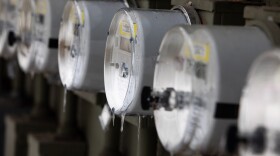Paula Gold-Williams, the president and CEO of CPS Energy, said the days leading up to February’s winter storm were nerve-wracking.
“As we were entering the week before, we started seeing that it was going to cover the entire state, which is extremely unusual for Texas,” she remembered.
Demand for electricity and heating would be huge. To prepare, Gold-Williams said, San Antonio's city-owned utility had to make sure it had enough electricity contracted and enough natural gas to supply its customers and fuel its own power plants.
But then something else started happening. As demand grew and supply tightened, natural gas prices started to rise, Gold-Williams said.
“We started seeing a doubling and tripling of the prices as we were getting to the end of the week just before the storm,” she said.
By the time the state got hit by the freeze and the worst blackout in its history, electric prices hit their market cap. And some natural gas prices were 15,000% higher than they were before the storm, Gold-Williams said.
In many cases, utilities had no choice but to buy.
“It would be like you're going to fill up your gas tank during the storm. ... and instead of paying fifty-ish dollars to fill up your tank, the register there reads: ‘give me $6,000 to $7,000,’” Gold-Williams said.
But while jacking up the price of gasoline during a disaster is illegal in Texas, it’s not clear whether the same is true for what happened to natural gas prices.
In Texas’ deregulated energy market, high prices during times of scarcity are not just expected, they are often considered a sign that the market is working.
But CPS Energy says this was different — the utility is calling it price gouging.
CPS is one of several utilities and private companies suing natural gas suppliers and the Electric Reliability Council of Texas, the state’s grid operator, over the price increases. The state and the Federal Energy Regulatory Commission are also investigating what happened.
Short Squeeze
Those investigations will be looking for signs that gas suppliers withheld their product from the market to inflate the price of gas during the crisis.
“This is behavior that's taught in MBA programs,” said Ed Hirs, an energy economist at the University of Houston who has long warned about such behavior in Texas. “You want to push the market into a position where it's a short squeeze, where sellers actually have market power.”
Hirs said that can be done by holding back the product itself — in this case, gas or electricity — or by manipulating the contracts for those products on the financial markets.
“When [gas] producers, when generators can combine and withhold power from the market, they can drive the price up,” he said.
That's what private electricity company Vistra seems to be alleging in litigation against Koch, one of its gas suppliers. Vistra accuses Koch of withholding natural gas supply, according to its quarterly report.
Poor Planning
The gas companies being sued and ERCOT deny any wrongdoing.
Energy Transfer Partners is one of the companies in litigation with CPS Energy. It is estimated that the company made about $2.4 billion selling gas at high prices during the storm.
In a statement in response to the lawsuit, Energy Transfer Partners says CPS bought gas at higher prices during the blackout because it “did not properly prepare in advance of the storm.”
“The gas that we sold to CPS was at fully negotiated and transparent pricing. They were not obligated to purchase any gas from us,” the statement reads in part.
Proving any price gouging could be tricky.
Energy analysts say a number of states have clearer laws and more oversight over what constitutes price gouging when it comes to natural gas. But the Texas gas market is largely one of private deals between buyers and sellers.
Beth Garza is a former independent market monitor for the state’s electric grid who spent years investigating fraud.
She said the natural gas industry in Texas doesn't have the rules against market manipulation that the electricity sector, for example, does.
“If your market doesn't have any rules against withholding, people will withhold because it's profitable,” Garza said.
Gold-Williams said that’s all the more reason to sue.
“ This is why we're fighting a fight that has never been seen in Texas before, because the market didn't work,” she said.
Gold-Williams hopes the lawsuits will lead the courts to establish a definition for what constitutes natural gas price gouging.







